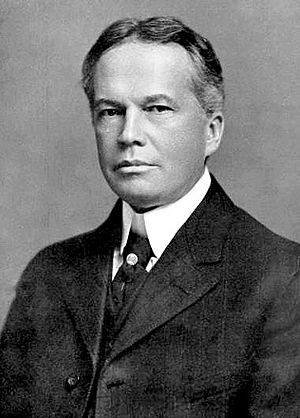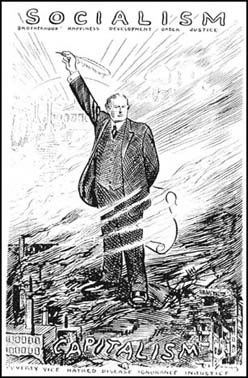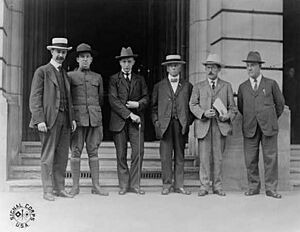Charles Edward Russell facts for kids
Quick facts for kids
Charles Edward Russell
|
|
|---|---|

C.E. Russell, c. 1907
|
|
| Born | September 25, 1860 Davenport, Iowa |
| Died | April 23, 1941 (aged 80) Washington, DC |
| Occupation |
|
| Notable awards | Pulitzer Prize, biography, 1928 |
| Relatives | Frederick Russell Burnham (first cousin); Howard Burnham (first cousin) |
Charles Edward Russell (born September 25, 1860, in Davenport, Iowa – died April 23, 1941, in Washington, D.C.) was an important American journalist, writer, and political activist. He wrote many books about people's lives and about society. In 1928, he won the Pulitzer Prize for Biography or Autobiography for his book The American Orchestra and Theodore Thomas.
Contents
Early Life and First Jobs
Charles Edward Russell was born in Davenport, Iowa. This city was a busy transportation hub on the Mississippi River. His father, Edward Russell, was the editor of a newspaper called the Davenport Gazette. He was also known for being against slavery. Charles's family was very religious. His grandfather was a Baptist minister, and his father was a Sunday school leader.
Charles went to high school at St. Johnsbury Academy in St. Johnsbury, Vermont. While he was there, he also worked with his father at the newspaper. Later, Russell wrote for several big newspapers. These included the Minneapolis Journal, the Detroit Tribune, and the New York World. He also worked for William Randolph Hearst's Cosmopolitan magazine. From 1894 to 1902, he was a writer and editor in New York and Chicago.
Fighting for Fairness: Muckraking
Charles Edward Russell wanted to make the world a better place. He saw how hard people in New York had to work. They often had unfair working conditions and low pay. Many workers, especially immigrants, were in crowded spaces with few breaks. Big companies often did not care about their employees' well-being. Seeing these problems made Russell want to help.
Russell was part of a group of journalists called muckrakers. These writers investigated and reported on unfair practices. They wrote about problems in society, like difficult working conditions. Their work helped lead to many changes. These changes included improvements in prisons and railroads.
A historian named Louis Filler called Russell a leader among the muckrakers. Russell wrote one of his most famous books, "The Greatest Trust in the World," after his first wife passed away. This book showed the terrible conditions in the meatpacking industry.
Russell's reports on the unfair and unhealthy practices at the Chicago stock yards inspired Upton Sinclair's famous novel The Jungle. This book caused a national outcry. It led to new rules for inspecting meat. Russell also wrote about the Trinity Church. He said the church owned some of the worst slum properties in New York City. This report made the church quickly clean up or sell its bad properties.
After traveling and investigating problems around the world, Russell became more convinced that capitalism had flaws. He felt that the financial system in the United States was unfair. As his beliefs grew stronger, he realized they matched the ideas of the Socialist Party. He decided to join them in 1908.
Helping Start the NAACP
In 1909, Charles Russell was one of 63 people who helped create the National Association for the Advancement of Colored People (NAACP). This group was formed after a race riot in Springfield, Illinois, in 1908. Russell joined the NAACP because of his own experiences with racism and violence when he was young. For example, his father faced danger just for being against slavery. Russell served on the NAACP's board of directors for the rest of his life.
A Politician's Path
In 1908, Russell joined the Socialist Party of America. He ran for Governor of New York in 1910 and 1912. He also ran for U.S. Senator from New York in 1914. He even ran for Mayor of New York City.
In 1915, Russell believed that Germany was a threat to the United States. He supported President Woodrow Wilson's plan to prepare for war. This decision caused problems for Russell within his party. Most members of the Socialist Party were against war. Their leader, Eugene Debs, thought Russell's support for Wilson cost him the chance to be the party's presidential candidate in 1916. Later that year, Russell left his party. He joined a group called "pro-war socialists." Debs disagreed with Russell's views on the war but respected his courage.
Russell was eventually removed from the Socialist Party in 1917. This happened because he supported the United States joining World War I.
A Mission to Russia
After the February Revolution in Russia, President Wilson asked Russell to join a special group. This group, led by Elihu Root, went to Russia in 1917. Their goal was to keep the Russian government, led by Alexander Kerensky, fighting in the war. The group suggested that George Creel's Committee on Public Information should create pro-war messages in Russia. Russell personally asked Wilson to use movies to influence the Russian public. Wilson liked this idea, and the Committee on Public Information then developed ways to show films in Russia. Russell even appeared as himself in a 1917 movie called The Fall of the Romanoffs.
Being part of the Root Mission meant Russell could not go back to the Socialist Party. The party was strongly against the war. Russell left it and joined the Social Democratic League of America. He also worked with the American Federation of Labor. He helped create the American Alliance for Labor and Democracy. This group encouraged American workers to support the country's involvement in the war.
Later Years and Legacy
After these events, Russell became a writer for a social democratic magazine called The New Leader. He passed away on April 23, 1941, in Washington, DC, at the age of 80.
Charles Edward Russell's writings and papers are kept at the Library of Congress in Washington, DC.
Images for kids
 | Kyle Baker |
 | Joseph Yoakum |
 | Laura Wheeler Waring |
 | Henry Ossawa Tanner |




